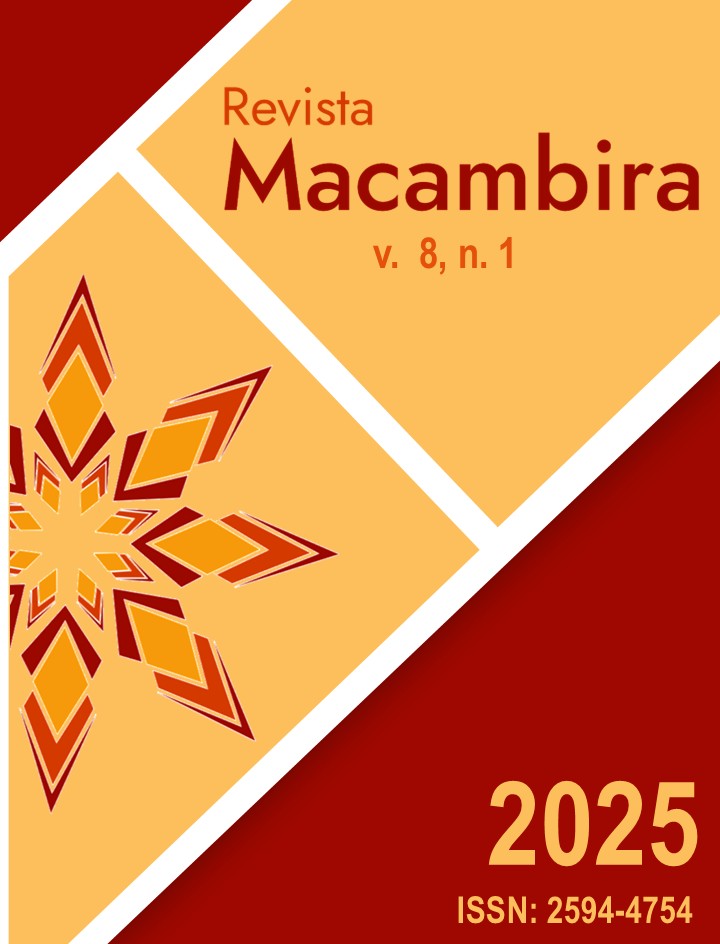A new “living sun”: childhood and orality towards an African ancestral pedagogy
DOI:
https://doi.org/10.35642/rm.v9i1.1660Keywords:
Afrocentric Pedagogy, Childhood, Orality, KindeziAbstract
In this work, we propose an ongoing effort to decolonize hegemonic narratives, reaffirm the role of orality, contribute to teacher education from a decolonial perspective, and enable the inclusion and valorization of traditional knowledge within educational networks. The primary objective is to promote an antiracist early childhood education practice that values non-Western forms of knowledge, emphasizing the importance of orality in teacher training from an African ancestral perspective. This approach seeks to recognize orality as a meaningful pedagogical practice within the learning process, enhancing knowledge and lived experiences rooted in children’s everyday oral practices. Furthermore, it is essential to note that implementing orality as a teaching methodology in the classroom does not imply the exclusion of conventional written language. Adopting a bibliographic and qualitative approach, this study draws on theoretical contributions from African and Brazilian scholars - among them, Amadou Hampâté Bâ, regarded as the father of African oral tradition; Cajé; K. Kia Bunseki Fu-Kiau and A.M. Lukondo-Wamba, titled Kindezi: The Kongo Art of Babysitting. As a result, we reflect on how educational practices rooted in Afro-Brazilian religious communities (terreiro) and African philosophical foundations — whether oral or written — can be integrated into formal schooling. This integration serves to honor and value the experiences and lived realities of socially engaged subjects, contributing to an educational model that affirms Black culture and embraces social, cultural, and religious forms of knowledge production.
Downloads
References
ALTUNA, Raul Ruiz de Asúa. Cultura tradicional Bantu. 2. ed. Paulinas editora, Águeda – Portugal, 2006. Disponível em: https://www.acbantu.org.br/wp-content/uploads/2024/11/culttura_tradicional_banta.pdf. Acesso em: 8 mar. 2025.
BÂ, Amadou Hampâté. A tradição viva. Tradução de Olga Soares. São Paulo: Palas Athena, 2010. Disponível em: https://nyemba.unilab.edu.br/wp-content/uploads/2017/04/A-tradi%C3%A7%C3%A3o-viva-Amadou-Hampat%C3%A9-B%C3%A2-texto-basico.pdf. Acesso em: 15 nov. 2024.
BRASIL. Ministério da Educação. Educação infantil e ensino fundamental. Brasília: MEC/Secretaria de Educação Básica, 2018. Disponível em: https://basenacionalcomum.mec.gov.br/images/BNCC_EI_EF_110518_versaofinal_site.pdf. Acesso em: 12 jan. 2025.
BRASIL. Lei nº 10.639, de 9 de janeiro de 2003. Altera a Lei nº 9.394, de 20 de dezembro de 1996, que estabelece as diretrizes e bases da educação nacional, para incluir no currículo oficial da Rede de Ensino a obrigatoriedade da temática “História e Cultura Afro-Brasileira”. Diário Oficial da União: seção 1, Brasília, DF, p. 1, 10 jan. 2003. Disponível em: https://etnicoracial.mec.gov.br/images/pdf/lei_10639_09012003.pdf. Acesso em: 20 out. 2024.
BRITTO, Alexandre do Nascimento. Educação de terreiro e saberes negros: a encruzilhada como filosofia pedagógica. In: BRITO, Eduardo; FERREIRA, Fernanda (org.). Educação e religiosidade afro-brasileira. São Paulo: Odun, 2020. p. 83-96.
CAJÉ, João. Oralidade, ancestralidade e literatura negra infantil: a experiência de ensinar e aprender com histórias negras. Salvador: EDUFBA, 2017.
CAPUTO, Stela Guedes. Educação nos terreiros: e como a escola se relaciona com crianças de candomblé. Rio de Janeiro. Pallas, 2012.
CASTILLO, Rosane. Cotidiano, infância e cultura: saberes e práticas educativas no terreiro. Revista Brasileira de Educação, Rio de Janeiro, v. 15, n. 44, p. 65-78, jan./abr. 2010. Disponível em: https://www.revistas.usp.br/ceru/article/download/198917/184761/569498. Acesso em: 24 jan. 2025.
FREIRE, Paulo. Pedagogia do oprimido. 17. ed. Rio de Janeiro: Paz e Terra, 1970. Disponível em: http://www.letras.ufmg.br/espanhol/pdf/pedagogia_do_oprimido.pdf. Acesso em: 28 jun. 2025.
FU-KIAU, K. Kia Bunseki; LUKONDO-WAMBA, A. M. Kindezi: a arte kongo de cuidar de crianças. Tradução de Mo Maiê. Brasília: Rede Africanidades, 2017. Disponível em: https://www.scribd.com/document/763863126/FUKIAU-KINDEZI. Acesso em: 9 jan. 2025.
MARCUSCHI, Luiz Antônio. Gêneros textuais: definição e funcionalidade. São Paulo: Contexto, 2008. Disponível em: https://midiasstoragesec.blob.core.windows.net/001/2017/02/02-marcuschi-gneros-textuais.pdf. Acesso em: 23 fev. 2024.
MATTAR, Fernanda Pereira et al. Dez anos da Lei 11.645/08: implementação, limites e possibilidades. Brasília: MEC, 2020. Disponível em: https://observatoriodh.com.br/wp-content/uploads/2020/12/525-3-1803-1-10-20201005.pdf. Acesso em: 3 jan. 2025.
NASCIMENTO, Rosana dos Santos; CASTRO, Luiz Fernando; BRAZÃO, Adriana Lima. Saberes ancestrais e educação: caminhos para a valorização da identidade étnico-racial. Revista Interritórios, Uberlândia, v. 7, n. 15, p. 1-15, jan./jun. 2022. Disponível em: https://dialnet.unirioja.es/descarga/articulo/7641418.pdf. Acesso em: 15 fev. 2025.
RABELO, Ana Paula Gomes. A educação nos terreiros de candomblé: saberes construídos na prática. Revista Africanidades, São Paulo, v. 5, n. 9, p. 88-100, jan./jun. 2014. Disponível em: https://www.revistas.usp.br/ceru/article/download/198917/184761/569498 Acesso em: 12 fev. 2025.
SANT’ ANNA SOBRINHO, José. Terreiros de egúngún: um culto ancestral afro-brasileiro. Salvador: EDUFBA, 2015.
SILVA, Andreza Gomes da; SANTANA, Fernanda de Souza. A oralidade e o terreiro como espaço pedagógico de resistência. Revista Afrocientista, Salvador, v. 3, n. 1, p. 102-120, 2021. Disponível em: https://repositorio.ufba.br/bitstream/ri/40222/1/Disserta%C3%A7%C3%A3o%20final.pdf. Acesso em: 10 fev. 2025.
SILVA, Josimar Santana. A língua dos bastardos vítimas do colonialismo português. Revista Macambira, Serrinha (BA), v. 8, n. 1, e081035, jan-dez, 2024. Disponível em: https://revista.lapprudes.net/RM/article/view/1420/1332. Acesso em: 27 jun. 2025.
SISS, Arlete; FRANCISCO, Lúcia Helena. Infância no terreiro: um estudo etnográfico sobre educação afro-brasileira. São Paulo: Edições do Terreiro, 2020. Disponível em: https://www.academia.edu/108395241/EBOOK_Doma_Saberes_Negros_e_Enfrentamento_ao_Racismo. Acesso em: 13 dez. 2025.
Downloads
Published
Issue
Section
License
Copyright (c) 1969 Revista Macambira

This work is licensed under a Creative Commons Attribution 4.0 International License.












